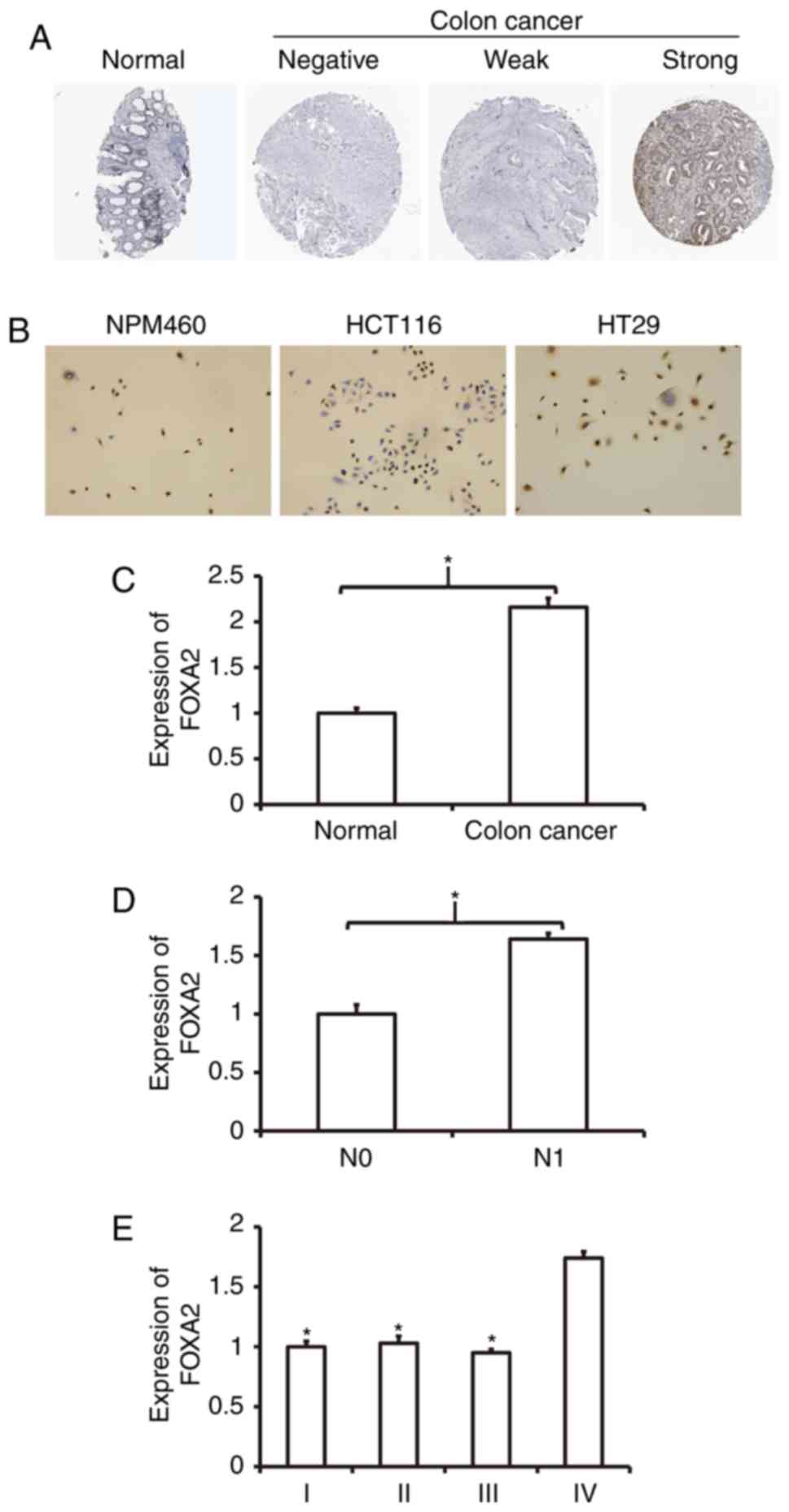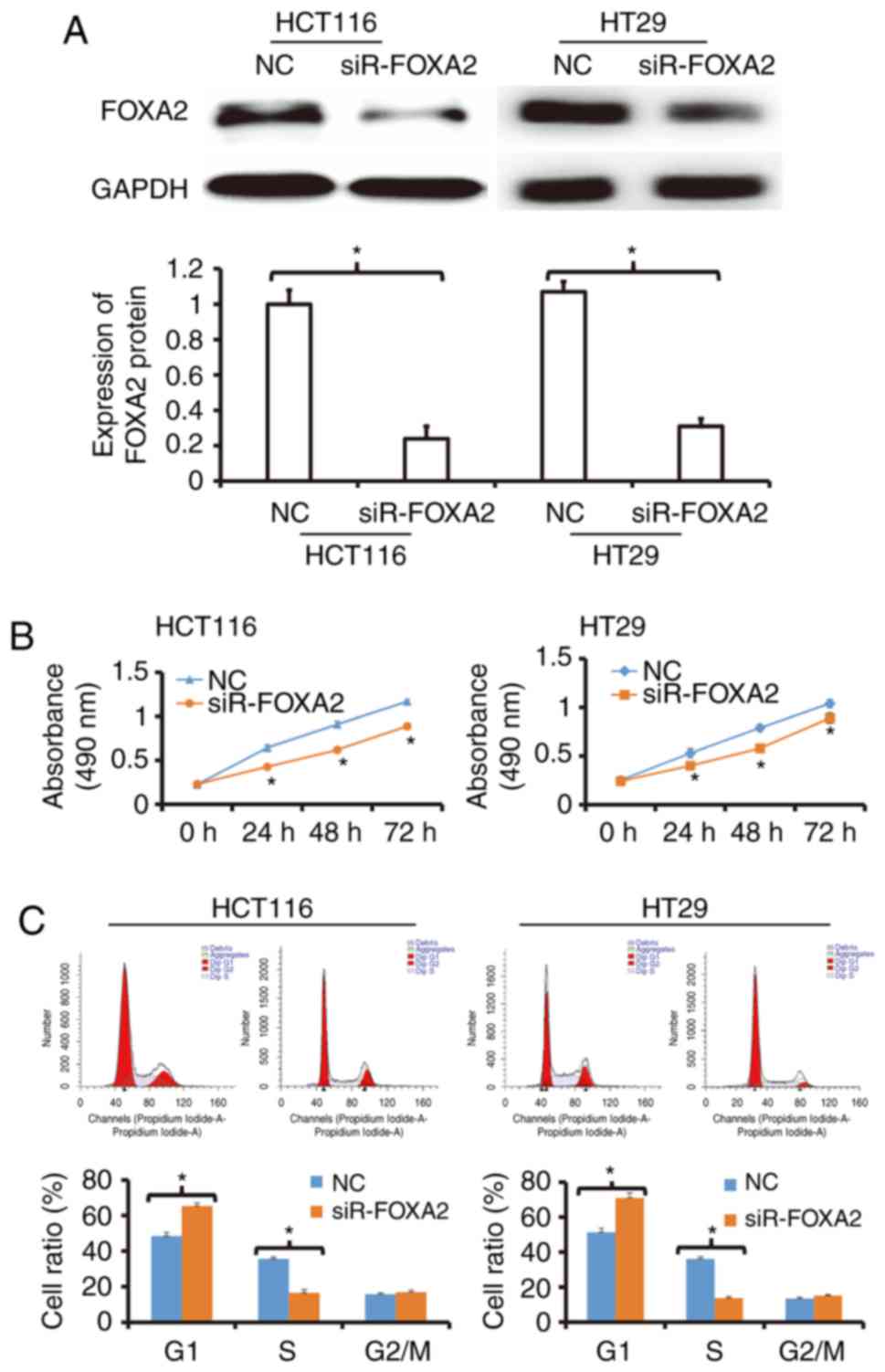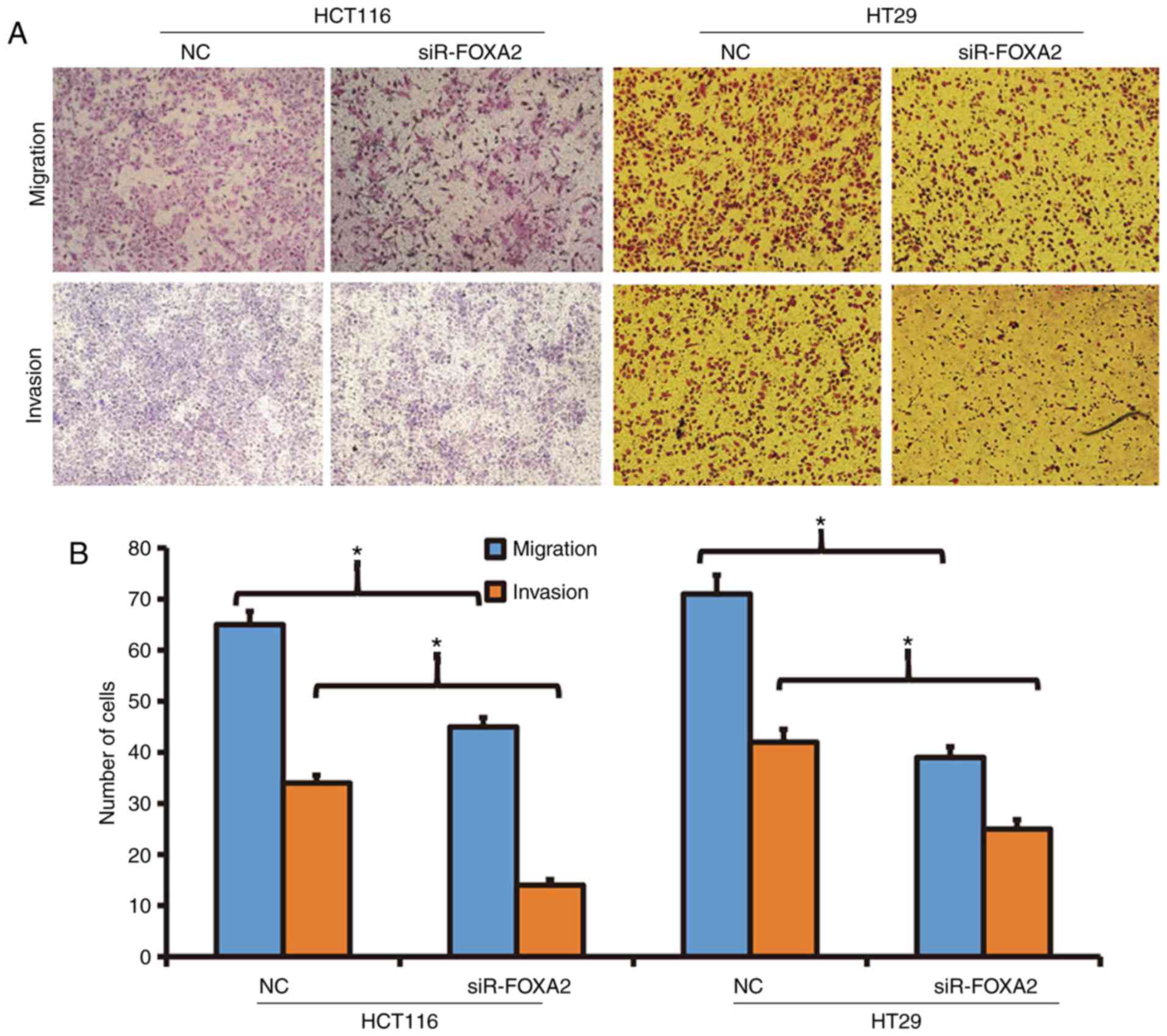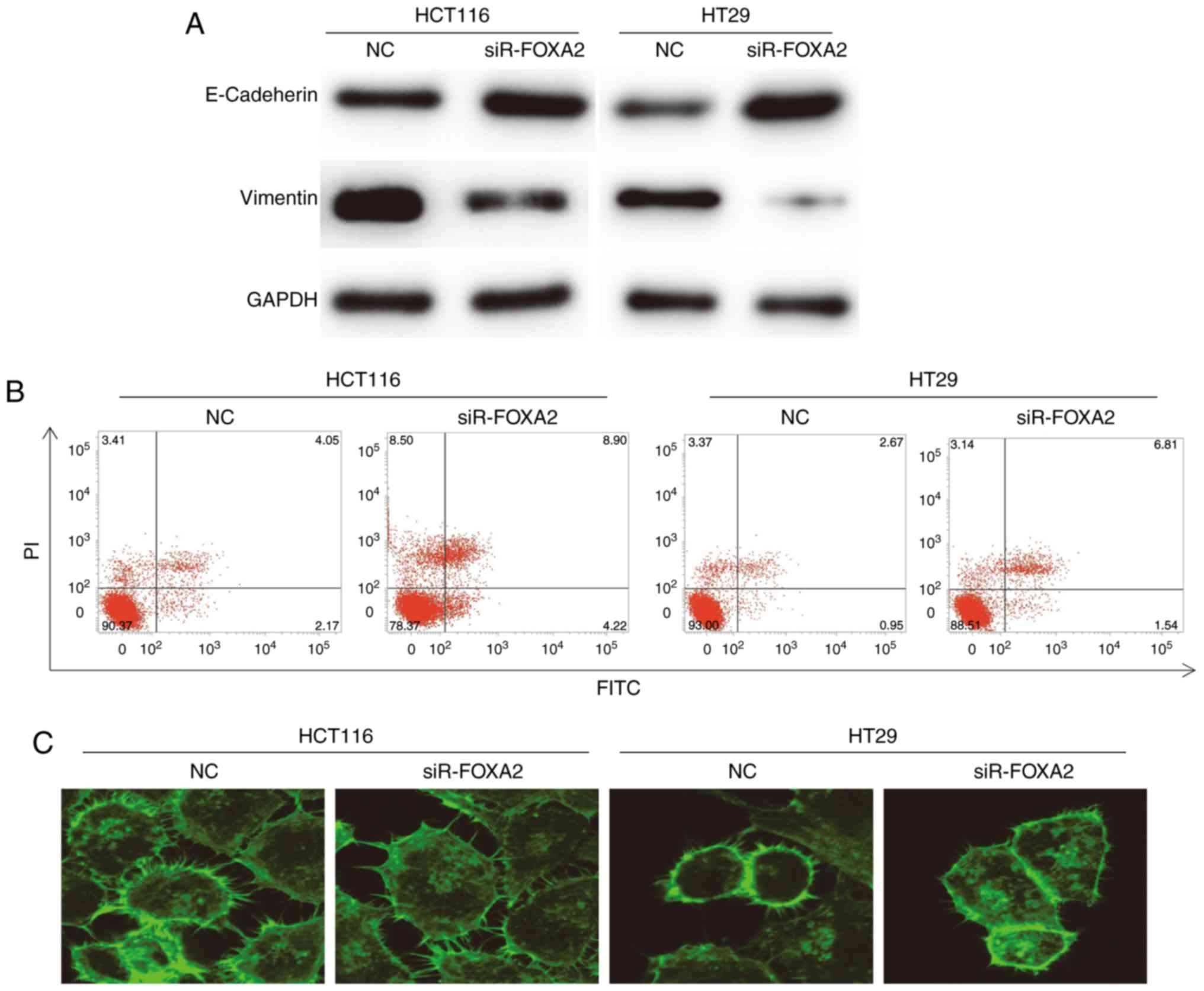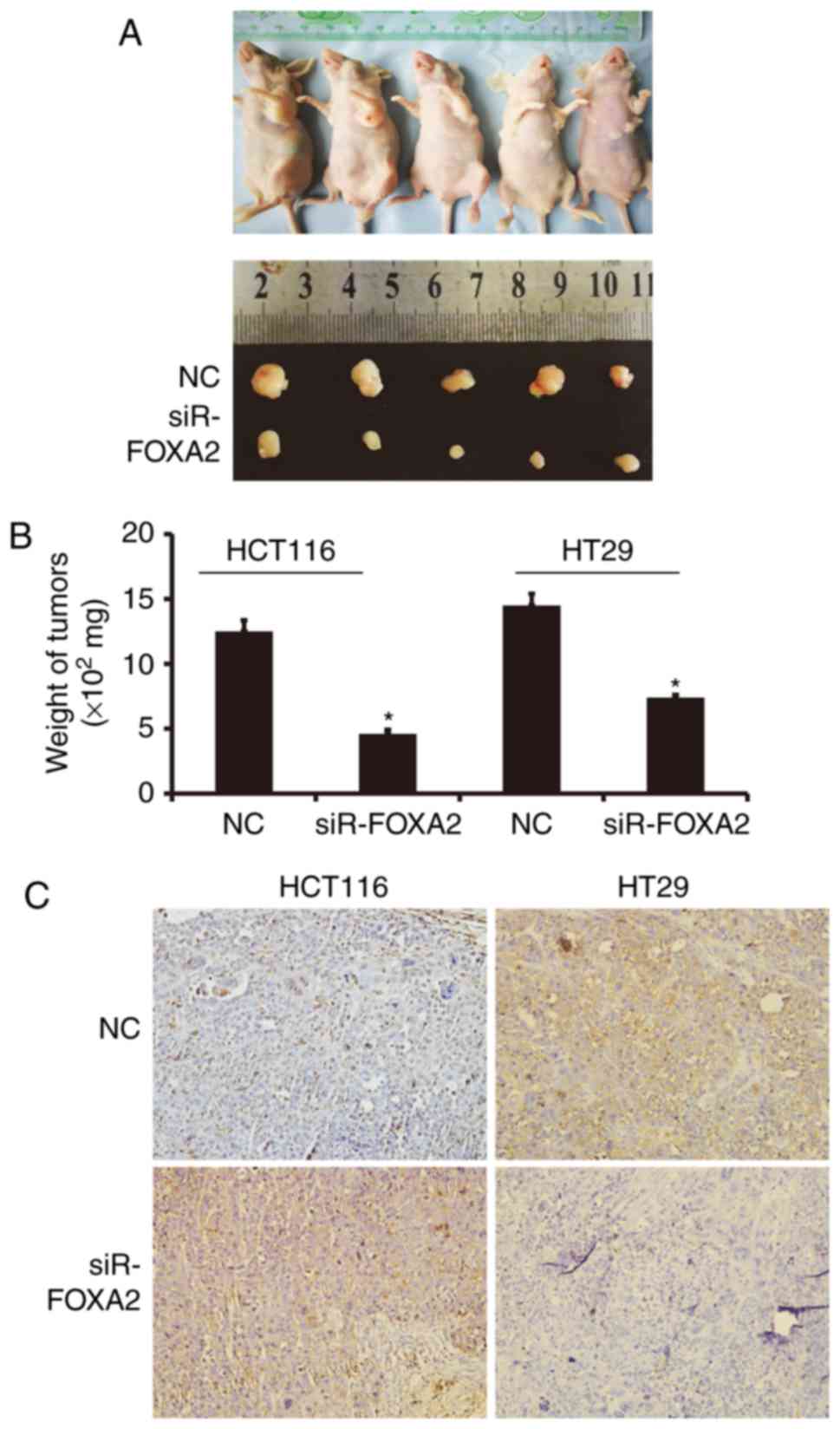|
1
|
Chen Y, Fang L, Li G, Zhang J, Li C, Ma M,
Guan C, Bai F, Lyu J and Meng QH: Synergistic inhibition of colon
cancer growth by the combination of methylglyoxal and silencing of
glyoxalase I mediated by the STAT1 pathway. Oncotarget.
8:54838–54857. 2017.PubMed/NCBI
|
|
2
|
Chino XMS, Martinez CJ, Garzón VRV,
González IÁ, Treviño SV, Bujaidar EM, Ortiz GD and Hoyos RB: Cooked
chickpea consumption inhibits colon carcinogenesis in mice induced
with azoxymethane and dextran sulfate sodium. J Am Coll Nutr.
36:391–398. 2017. View Article : Google Scholar : PubMed/NCBI
|
|
3
|
Cusimano A, Balasus D, Azzolina A, Augello
G, Emma MR, Di Sano C, Gramignoli R, Strom SC, McCubrey JA,
Montalto G and Cervello M: Oleocanthal exerts antitumor effects on
human liver and colon cancer cells through ROS generation. Int J
Oncol. 51:533–544. 2017. View Article : Google Scholar : PubMed/NCBI
|
|
4
|
Cho N, Ransom TT, Sigmund J, Tran T,
Cichewicz RH, Goetz M and Beutler JA: Growth inhibition of colon
cancer and melanoma cells by versiol derivatives from a
paraconiothyrium species. J Nat Prod. 80:2037–2044. 2017.
View Article : Google Scholar : PubMed/NCBI
|
|
5
|
Myint ZW and Goel G: Role of modern
immunotherapy in gastrointestinal malignancies: A review of current
clinical progress. J Hematol Oncol. 10:862017. View Article : Google Scholar : PubMed/NCBI
|
|
6
|
Goel G and Sun W: Advances in the
management of gastrointestinal cancers-an upcoming role of immune
checkpoint blockade. J Hematol Oncol. 8:862015. View Article : Google Scholar : PubMed/NCBI
|
|
7
|
Hou PC, Li YH, Lin SC, Lin SC, Lee JC, Lin
BW, Liou JP, Chang JY, Kuo CC, Liu YM, et al: Hypoxia-induced
downregulation of DUSP-2 phosphatase drives colon cancer stemness.
Cancer Res. 77:4305–4316. 2017. View Article : Google Scholar : PubMed/NCBI
|
|
8
|
Pahwa M, Harris MA, MacLeod J, Tjepkema M,
Peters PA and Demers PA: Sedentary work and the risks of colon and
rectal cancer by anatomical sub-site in the Canadian census health
and environment cohort (CanCHEC). Cancer Epidemiol. 49:144–151.
2017. View Article : Google Scholar : PubMed/NCBI
|
|
9
|
Múnera JO, Sundaram N, Rankin SA, Hill D,
Watson C, Mahe M, Vallance JE, Shroyer NF, Sinagoga KL,
Zarzoso-Lacoste A, et al: Differentiation of human pluripotent stem
cells into colonic organoids via transient activation of BMP
signaling. Cell Stem Cell. 21:51–64.e6. 2017. View Article : Google Scholar : PubMed/NCBI
|
|
10
|
Ancey PB, Ecsedi S, Lambert MP, Talukdar
FR, Cros MP, Glaise D, Narvaez DM, Chauvet V, Herceg Z, Corlu A and
Hernandez-Vargas H: TET-catalyzed 5-hydroxymethylation precedes
HNF4A promoter choice during differentiation of bipotent liver
progenitors. Stem Cell Reports. 9:264–278. 2017. View Article : Google Scholar : PubMed/NCBI
|
|
11
|
Von Stetina SE, Liang J, Marnellos G and
Mango SE: Temporal regulation of epithelium formation mediated by
FoxA, MKLP1, MgcRacGAP, and PAR-6. Mol Biol Cell. 28:2042–2065.
2017. View Article : Google Scholar : PubMed/NCBI
|
|
12
|
McFadden VC, Shalaby RE, Iram S, Oropeza
CE, Landolfi JA, Lyubimov AV, Maienschein-Cline M, Green SJ,
Kaestner KH and McLachlan A: Hepatic deficiency of the pioneer
transcription factor FoxA restricts hepatitis B virus biosynthesis
by the developmental regulation of viral DNA methylation. PLoS
Pathog. 13:e10062392017. View Article : Google Scholar : PubMed/NCBI
|
|
13
|
Li J, Machado Dantas AC, Guo M, Sagendorf
JM, Zhou Z, Jiang L, Chen X, Wu D, Qu L, Chen Z, et al: Structure
of the forkhead domain of FOXA2 bound to a complete DNA consensus
site. Biochemistry. 56:3745–3753. 2017. View Article : Google Scholar : PubMed/NCBI
|
|
14
|
Bastidas-Ponce A, Roscioni SS, Burtscher
I, Bader E, Sterr M, Bakhti M and Lickert H: Foxa2 and Pdx1
cooperatively regulate postnatal maturation of pancreatic β-cells.
Mol Metab. 6:524–534. 2017. View Article : Google Scholar : PubMed/NCBI
|
|
15
|
Rausa FM III, Hughes DE and Costa RH:
Stability of the hepatocyte nuclear factor 6 transcription factor
requires acetylation by the CREB-binding protein coactivator. J
Biol Chem. 279:43070–43076. 2004. View Article : Google Scholar : PubMed/NCBI
|
|
16
|
Zhang L, Rubins NE, Ahima RS, Greenbaum LE
and Kaestner KH: Foxa2 integrates the transcriptional response of
the hepatocyte to fasting. Cell Metab. 2:141–148. 2005. View Article : Google Scholar : PubMed/NCBI
|
|
17
|
Lehner F, Kulik U, Klempnauer J and Borlak
J: Inhibition of the liver enriched protein FOXA2 recovers HNF6
activity in human colon carcinoma and liver hepatoma cells. PLoS
One. 5:e133442010. View Article : Google Scholar : PubMed/NCBI
|
|
18
|
Berg DT, Gerlitz B, Sharma GR, Richardson
MA, Stephens EJ, Grubbs RL, Holmes KC, Fynboe K, Montani D, Cramer
MS, et al: FoxA2 involvement in suppression of protein C, an
outcome predictor in experimental sepsis. Clin Vaccine Immunol.
13:426–432. 2006. View Article : Google Scholar : PubMed/NCBI
|
|
19
|
Kanaki M, Tiniakou I, Thymiakou E and
Kardassis D: Physical and functional interactions between nuclear
receptor LXRα and the forkhead box transcription factor FOXA2
regulate the response of the human lipoprotein lipase gene to
oxysterols in hepatic cells. Biochim Biophys Acta. 1860:848–860.
2017. View Article : Google Scholar : PubMed/NCBI
|
|
20
|
Li D, He C, Wang J, Wang Y, Bu J, Kong X
and Sun D: MicroRNA-138 inhibits cell growth, invasion and EMT of
non-small cell lung cancer via SOX4/p53 feedback loop. Oncol Res.
Jun 13–2017.(Epub ahead of print). View Article : Google Scholar
|
|
21
|
Zhou Q, Dai J, Chen T, Dada LA, Zhang X,
Zhang W, DeCamp MM, Winn RA, Sznajder JI and Zhou G: Downregulation
of PKCζ/Pard3/Pard6b is responsible for lung adenocarcinoma cell
EMT and invasion. Cell Signal. 38:49–59. 2017. View Article : Google Scholar : PubMed/NCBI
|
|
22
|
Wahl GM and Spike BT: Cell state
plasticity, stem cells, EMT, and the generation of intra-tumoral
heterogeneity. NPJ Breast Cancer. 3:142017. View Article : Google Scholar : PubMed/NCBI
|
|
23
|
Cao Z, Zheng X, Cao L and Liang N:
MicroRNA-539 inhibits the epithelial-mesenchymal transition of
esophageal cancer cells by twist-related protein 1-mediated
modulation of melanoma associated antigen A4 (MAGEA4). Oncol Res.
Jun 12–2017.(Epub Ahead of Print). View Article : Google Scholar
|
|
24
|
Lazarova D and Bordonaro M: ZEB1 mediates
drug resistance and EMT in p300-deficient CRC. J Cancer.
8:1453–1459. 2017. View Article : Google Scholar : PubMed/NCBI
|
|
25
|
Aquino RGF, Vasques PHD, Cavalcante DIM,
Oliveira ALS, Oliveira BMK and Pinheiro LGP: Invasive ductal
carcinoma: Relationship between pathological characteristics and
the presence of axillary metastasis in 220 cases. Rev Col Bras Cir.
44:163–170. 2017. View Article : Google Scholar : PubMed/NCBI
|
|
26
|
Laudato S, Patil N, Abba ML, Leupold JH,
Benner A, Gaiser T, Marx A and Allgayer H: P53-induced miR-30e-5p
inhibits colorectal cancer invasion and metastasis by targeting
ITGA6 and ITGB1. Int J Cancer. 141:1879–1890. 2017. View Article : Google Scholar : PubMed/NCBI
|
|
27
|
Schayek H, Laitman Y, Katz LH, Pras E,
Ries-Levavi L, Barak F and Friedman E: Colorectal and endometrial
cancer risk and age at diagnosis in BLMAsh mutation carriers. Isr
Med Assoc J. 19:365–367. 2017.PubMed/NCBI
|
|
28
|
Liu Z, Zhao Y, Fang J, Cui R, Xiao Y and
Xu Q: SHP2 negatively regulates HLA-ABC and PD-L1 expression via
STAT1 phosphorylation in prostate cancer cells. Oncotarget.
8:53518–53530. 2017.PubMed/NCBI
|
|
29
|
Nelson AC, Cutty SJ, Gasiunas SN, Deplae
I, Stemple DL and Wardle FC: In vivo regulation of the zebrafish
endoderm progenitor niche by T-Box transcription factors. Cell Rep.
19:2782–2795. 2017. View Article : Google Scholar : PubMed/NCBI
|
|
30
|
Shen Y, Nar R, Fan AX, Aryan M, Hossain
MA, Gurumurthy A, Wassel PC, Tang M, Lu J, Strouboulis J and
Bungert J: Functional interrelationship between TFII-I and E2F
transcription factors at specific cell cycle gene loci. J Cell
Biochem. 119:712–722. 2018. View Article : Google Scholar : PubMed/NCBI
|
|
31
|
Seo HS, Ku JM, Choi HS, Woo JK, Lee BH,
Kim DS, Song HJ, Jang BH, Shin YC and Ko SG: Apigenin overcomes
drug resistance by blocking the signal transducer and activator of
transcription 3 signaling in breast cancer cells. Oncol Rep.
38:715–724. 2017. View Article : Google Scholar : PubMed/NCBI
|
|
32
|
Ma Y, Wu L, Liu X, Xu Y, Shi W, Liang Y,
Yao L, Zheng J and Zhang J: KLF4 inhibits colorectal cancer cell
proliferation dependent on NDRG2 signaling. Oncol Rep. 38:975–984.
2017. View Article : Google Scholar : PubMed/NCBI
|
|
33
|
Stein U, Walther W, Arlt F, Schwabe H,
Smith J, Fichtner I, Birchmeier W and Schlag PM: MACC1, a newly
identified key regulator of HGF-MET signaling, predicts colon
cancer metastasis. Nat Med. 15:59–67. 2009. View Article : Google Scholar : PubMed/NCBI
|
|
34
|
Li C, Lu S and Shi Y: MicroRNA-187
promotes growth and metastasis of gastric cancer by inhibiting
FOXA2. Oncol Rep. 37:1747–1755. 2017. View Article : Google Scholar : PubMed/NCBI
|
|
35
|
Kondratyeva LG, Sveshnikova AA, Grankina
EV, Chernov IP, Kopantseva MR, Kopantzev EP and Sverdlov ED:
Downregulation of expression of mater genes SOX9, FOXA2, and GATA4
in pancreatic cancer cells stimulated with TGFβ1
epithelial-mesenchymal transition. Dokl Biochem Biophys.
469:257–259. 2016. View Article : Google Scholar : PubMed/NCBI
|
|
36
|
Tu MJ, Pan YZ, Qiu JX, Kim EJ and Yu AM:
MicroRNA-1291 targets the FOXA2-AGR2 pathway to suppress pancreatic
cancer cell proliferation and tumorigenesis. Oncotarget.
7:45547–45561. 2016. View Article : Google Scholar : PubMed/NCBI
|
|
37
|
Jayachandran A, Dhungel B and Steel JC:
Epithelial-to-mesenchymal plasticity of cancer stem cells:
Therapeutic targets in hepatocellular carcinoma. J Hematol Oncol.
9:742016. View Article : Google Scholar : PubMed/NCBI
|
|
38
|
Uhlén M, Fagerberg L, Hallström BM,
Lindskog C, Oksvold P, Mardinoglu A, Sivertsson Å, Kampf C,
Sjöstedt E, Asplund A, et al: Proteomics. Tissue-based map of the
human proteome. Science. 347:12604192015. View Article : Google Scholar : PubMed/NCBI
|















